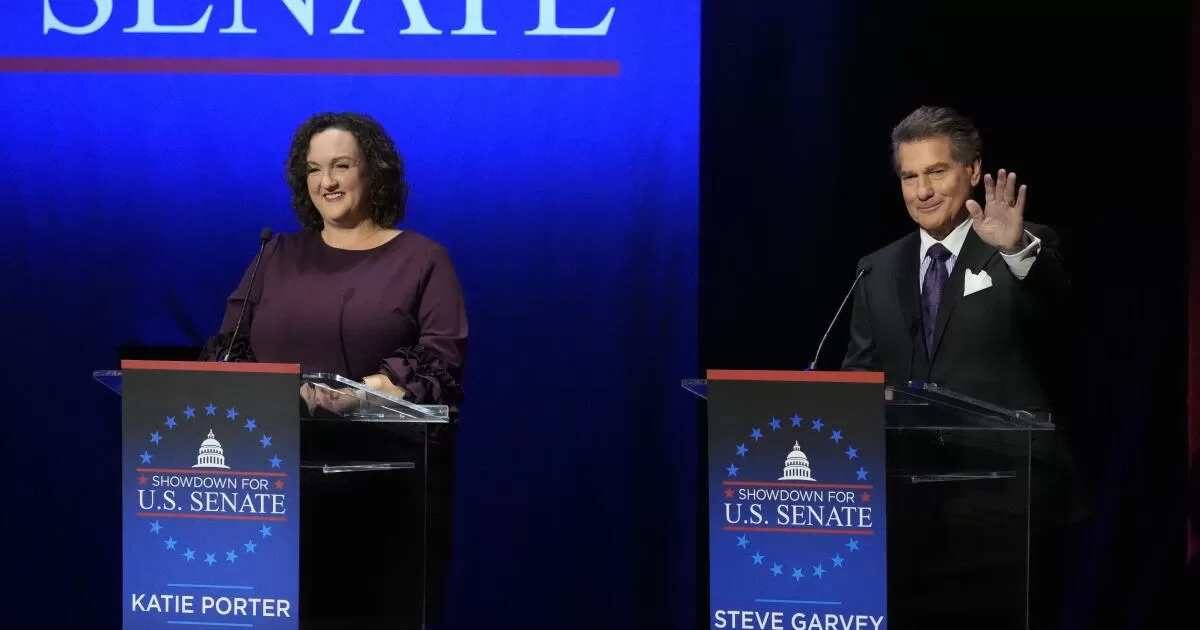I’ll explain that in a bit.
But first, here’s another political paradox: The Republican Senate underdog was helped by his three major Democratic opponents in a televised debate Monday night. That’s because they ganged up on him and flailed away.
Garvey needs to attract enough Republican votes in California’s March 5 primary to finish second and qualify for the November general election ballot. And hardly anything unites a Republican candidate and the party faithful more than Democrats attacking that candidate.
Trump has proved that.
If Democrats don’t like Garvey, he must be the right candidate for the job, in the minds of many Republican voters.
Now back to New Hampshire.
What Garvey needed was a Trump defeat — or at least his remaining rival, former South Carolina Gov. Nikki Haley, finishing a close enough second so she’d have some momentum going into her home state primary on Feb. 24.
South Carolina is strong Trump territory. A big win for him there would be seen as the former president practically nailing down the Republican renomination. That would be bad news for Garvey.
The former Los Angeles Dodger and San Diego Padre first baseman needs the California primary to be viewed as competitive to inspire a large Republican vote. There’ll be less incentive to cast ballots if the GOP nomination is seen as a done deal.
Republican voters are outnumbered 2 to 1 by Democrats in California. The top two vote-getters among Senate candidates will advance to the November runoff, regardless of their party. So, Garvey’s hopes of finishing No. 2 — forget about No. 1 — depend on a big GOP turnout.
“If it were reasonably competitive here, that would help Republican turnout. If it’s all over, that’s not good for Garvey,” says veteran Democratic political consultant Bill Carrick, who ran the late Sen. Dianne Feinstein’s California campaigns. It’s Feinstein’s old seat that the current candidates are trying to capture.
Democratic Rep. Adam B. Schiff of Burbank is the front-runner, based on polling. And he probably solidified that No. 1 position in the debate with his steady performance.
Garvey and Democratic Rep. Katie Porter of Irvine are running neck-and-neck for the No. 2 spot, with Rep. Barbara Lee (D-Oakland) not far behind. There are lots of undecided voters.
The former major league all-star got help from his Democratic opponents in the debate.
“By the time the three Democrats got through with him, they were making his case to Republican voters,” says Dan Schnur, who teaches political communications at USC and UC Berkeley and is a former GOP operative. “Every time they’re criticizing Garvey, they’re sending a message to Republicans to consolidate behind him.”
“There’s no way he’s going to be a senator,” Schnur adds. “But he was the most important person on the stage. Porter and Lee both think they can beat Schiff head-on in November. But if Garvey finishes second they’ll never get the chance.
“There’s nothing Schiff would love more than to run against Garvey.”
No Republican has won a statewide race in California since 2006.
Republican consultant Rob Stutzman, who isn’t involved in the Senate race, says Garvey also was helped by post-debate criticism in the news media for not taking clear stands on some issues and hedging on whether he’ll support Trump.
“The media beating up on Garvey for not having well-defined positions does not hurt him with Republican voters,” Stutzman told me. “Republican voters don’t react well to the media critiquing a Republican.
“They’ll be content to have a high-profile Republican run for the Senate and send out the Republican message in November. We haven’t had that since [former Hewlett-Packard Chief Executive] Carly Fiorina ran in 2010.”
Look, I think Garvey gets a bum rap for not stating firmly whether he’ll vote for Trump. He already has twice. And probably will again. “Both times, he was the best person for the job,” he said during the debate.
But Garvey refused to commit in this election.
“Once a Dodger, always as Dodger,” Porter asserted in one of the night’s better lines. “Mr. Garvey, this is not the minor leagues. Who will you vote for?”
“When the time comes,” Garvey responded, “I will look at the two opponents, I will determine what they did and at that time I will make my choice.”
I see this as a glass half full. Garvey deserves credit from Democrats for exhibiting some guts. He’s a rare Republican candidate who hasn’t fallen into a long line to kiss Trump’s ring. At least not yet.
Actually, not committing to the GOP idol could hurt him among Trump worshipers.
“As long as he’s not criticizing Trump, he’ll be OK with Republican voters,” Stutzman says. “I was impressed that he might be taking the most courageous position of any Republican Senate candidate in the United States.”
But he was lambasted by Democrats for vagueness.
“Steve Garvey didn’t get to first base,” former state Atty. Gen. Bill Lockyer told me. “He’s a nice man who’s way over his head both in policy and politics.”
“Horrible,” Carrick says. “No substance whatsoever.”
But Schnur says “he came across as a nonthreatening Republican.”
It was a good debate, hosted by Fox 11 News and Politico at USC. Better than most and definitely superior to the recent Republican presidential debates.
Garvey was the debate winner — not based on performance, but political dynamics — and a loser in New Hampshire.
